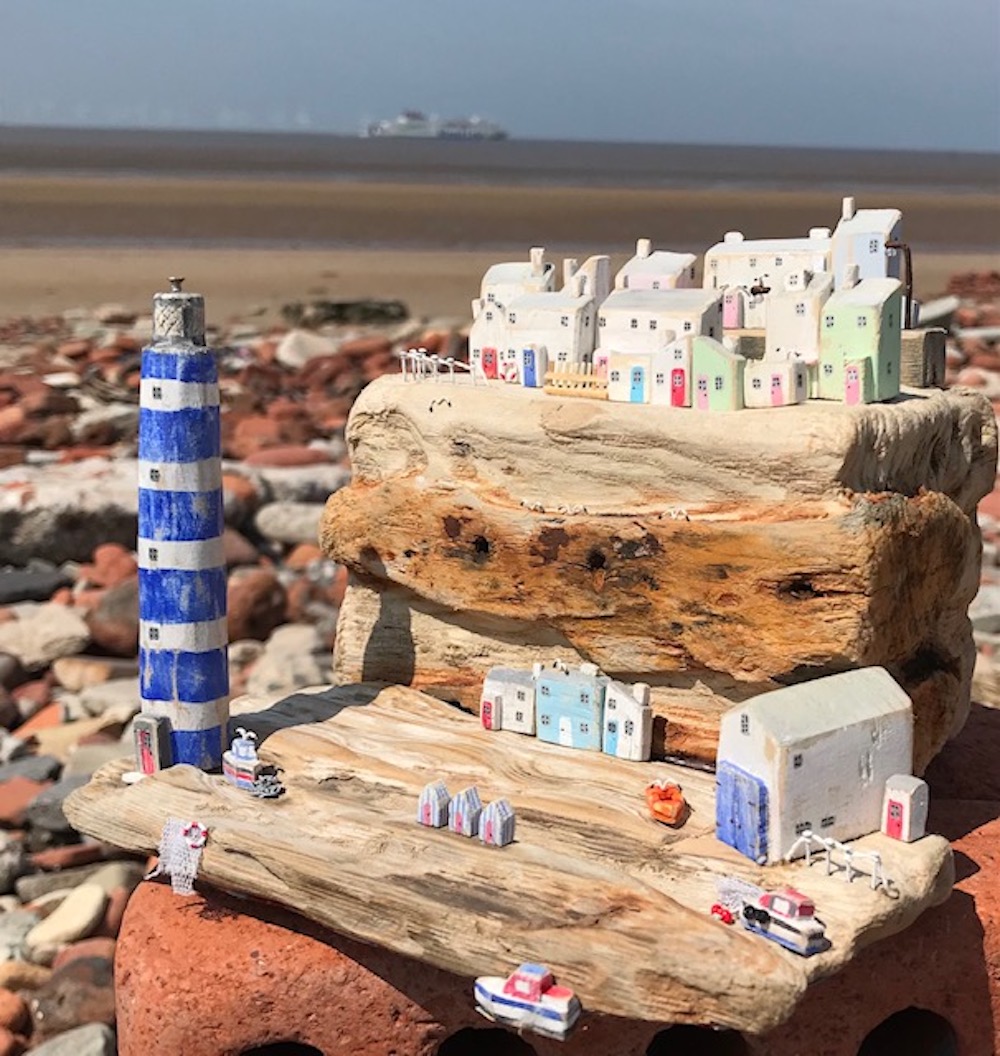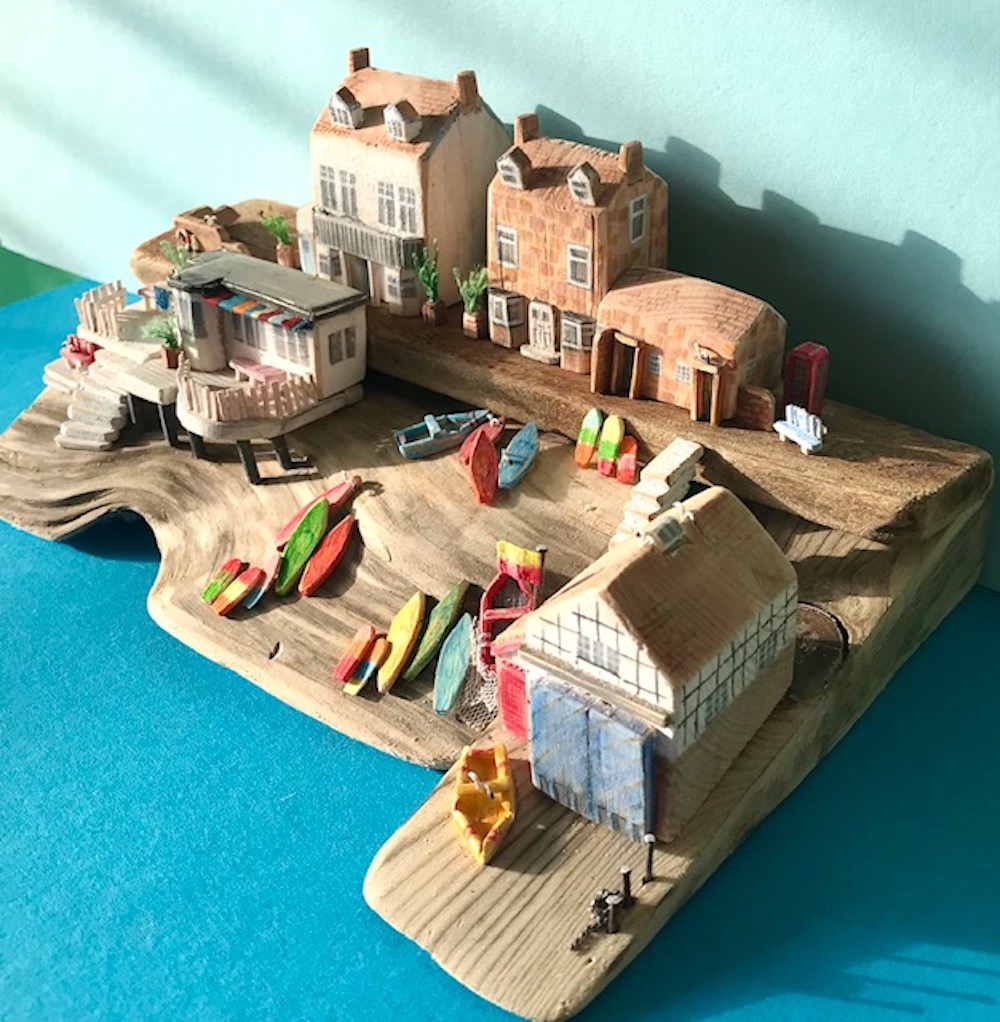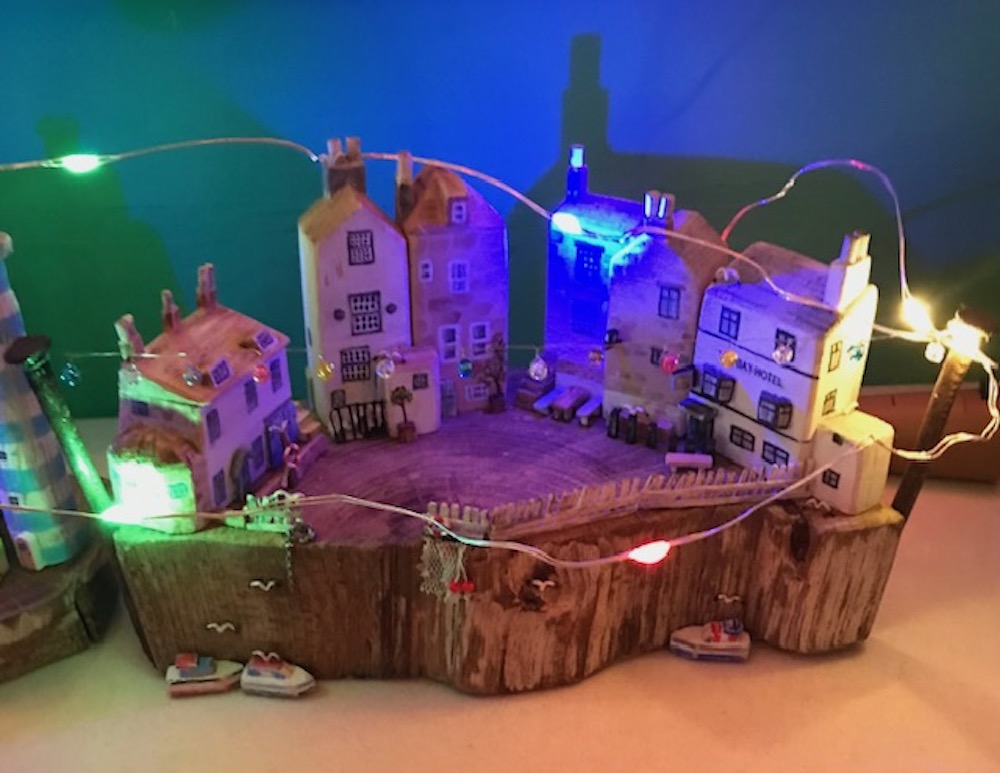By Pauline Neville

Helen Parry is the creative force behind Mollusc By The Sea. Born and bred in Liverpool and proud of it…. for Helen, art has been always in the background, whilst she lived her life. Although she loved art at school, she was persuaded to drop it in in favour of the sciences, as is often the case perceived by her family to be of more use. Although Helen tells me that in her youth, women were more commonly steered down the route of the caring professions and indeed Helen’s mother encouraged her Helen into nursing. She followed a career spanning nursing and midwifery but managed to take a foundation in fine arts along the way and married raising 3 daughters with her husband.
Helen and I chatted about being the mother of young children and how it can be a time when it would be easy to lose yourself to some degree, always being identified as someone’s mother, with people never remembering your name even ….only who you are in reference to a child that their child goes to school with. She declares lack of time to be the enemy of art. Indeed, people often tell us at our handmade markets that they’d love to try new crafts… If they only had the time. Retirement gave Helen the gift of time and she was able to indulge her desire to create. She decided that this time was hers and that she would use it exactly as she wanted.

Helen’s mother had taught her to crochet and she began making miniature everlasting cacti in tiny terracotta pots. The collection grew until it rivalled the palm house with tiny plants crowded onto every flat surface. Her brother mentioned that he’d never seen anything like them and suggested that perhaps she might sell them. Helen was unconvinced, as is so common. She was lacking confidence in her own work and felt that it would be too nerve racking to set it out before strangers . Luckily with her husbands support and her daughters’ encouragement she overcame her fears and booked a stall at her first market. After positive feedback and securing her first sale, she was thrilled….and hooked and began looking around for other markets to attend. She wanted to expand the crochet developing new stitches and patterns but came to realise that this craft was not for her.
We have always maintained at Liverpool Makers’ Bazaar that there is a craft for everyone and if you consider yourselves not to be creative it’s just that you have not yet discovered the medium that suits you.
While holidaying with her husband at a youth hostel in Boggle Hole, near Robin Hood’s Bay Helen was chatting to people who had been collecting items from the beach and discussing what could be done with these souvenirs when she spotted a tiny box on the wall made from driftwood. It housed a miniatures seaside scene. She was enthralled and the feeling stayed with her and once home, she determined to give it a go.
She remembered that when studying photography her college had organised a trip to Crosby Beach and she had been fascinated by the objects that the sand had yielded up. Beyond the usual sea washed pottery and driftwood there had been tiles, and man made metals and huge lumps of architectural stonework from municipal buildings. Intrigued, she researched the history of the beach and found that it was littered with rubble from the blitz.
She feels it is a record of normal lives swept up and dumped. When walking on the beach she says, you are walking on family history.
She reminisced about family holidays in Gronant Beach in N Wales in the 1960 and recalled many happy hours collecting treasures like sea washed glass, shells and tiny scraps of colourful plastic. During 2nd world war people of Liverpool were evacuated to Gronant where there was no electricity nor water as all the structures were handmade bungalows but the welcome was warm with locals donating caravans for families to live in. There were also railway carriages used as homes. Helen’s Great uncle built a bungalow there for her grandmother, where together with her 9 children and their children the family enjoyed many happy holidays there. What could be more quintessentially British than a seaside trip ?

Helen remembers it very much as a recycled village powered by the make do and mend philosophy very evident in Helen’s work today as all materials are found salvaged or gifted. Most frequently from the beaches they depict so quaintly.
So Helen began developing her trade mark scenes honing a plethora of crafts, woodwork painting and chiefly problem solving to allow her to turn her collection of salvage into desirable representations of tiny seaside scenes. Some are replicated from life, but in the main, they spring directly from her imagination. A combination of remembered structures form a lifetime of seaside trips. Under her skilful hands tiny scraps of discarded thread become seagulls and slithers of unwanted wood, colourful cottages or proud and purposeful lighthouses. Looking closely you will find miniature boats bobbing on the waves of painted seas.
Attendance at local art and craft markets such as Liverpool Makers’ Bazaar has helped Helen gain confidence and enjoy meeting new people. She mentioned that the atmosphere at the Lark Lane venue is always warm and friendly. The other stallholders are always welcoming and supportive and the customers friendly and always finding time to chat. They are intrigued by her work which invariably prompts happy conversations, memories of childhood holidays that they had enjoyed beside the sea.
As we become older, Helen muses, we hark back perhaps to the simple pleasures of our childhood, a day at the sea with the sand between our toes.
As the tiny worlds that Helen creates find their places on our shelves or walls they are little islands of mindfulness in our busy worlds.
Feel free to contact Helen on molluscz@icloud.com.
Or better still come visit her at The Old Police Station on Sunday 12 November, at Liverpool Makers’ Bazaar to appreciate her tiny worlds first hand.

